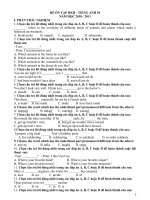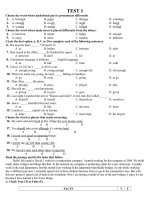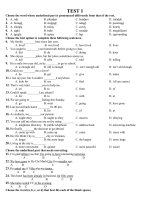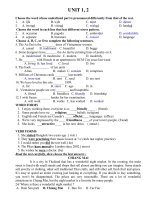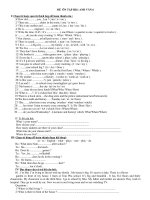đề ôn tập HKI tiếng Anh lớp 8(Phần 2)
Bạn đang xem bản rút gọn của tài liệu. Xem và tải ngay bản đầy đủ của tài liệu tại đây (134.46 KB, 8 trang )
test
A. LANGUAGE FOCUS:
I. Choose the best answer and circle
1. I often play soccer…………………… Sunday afternoon.
A in B. at C. on D. for
2.We should wait here………………. Our teacher comes back.
A. before B. until C. after D.during
3. Mr Brown is the same age………………. Mrs. Brown.
A. as B. like C.from D. with
4. The little boy is not ………………. To lift the suitcase.
A. enough strong B. strong enough C. too strong D. so strong
5. My father was good at swimming. He used to……………. swimming in summer
A. go B. goes C.went D.going
6. Kate hates………………. to classical music.
A listen B. listened C. listen D listening
7. Hung is………… student in my class.
A. good B. better C. the best D. a best
8. Ho Chi Minh City is larger and………. beautiful than HaNoi.
A. more B. as C. most D the most
9. Mr.Smith likes……… to music in his free time.
a. listens b. listened c. listen d. listening
10. They built this house…………… 1990.
A. from B. in C. at D. between
11. We must be there…………… 7.30 and 8.15.
A at B. before C. between D after
12. Dad stay at the office……………. He finished the report.
A. between B.until C. for D. at
13. VietNamese language is different………… English language.
A as B. like C. from D with
14. Tom is 16. He isn’t ……………. to drive a car.
A. enough young B. young enough C. enough old D. old enough
15. When my uncle was young. He used………… fishing on Sundays.
A. go B. went C. going D. to go
16. Mary likes…………. the piano.
A. playing B. plays C. played D. play
17. She told me ……………… you that present.
A giving B. to give C. gave D. given
18. Last night, I watched the movie “Romeo and Juliet”. At last they killed…………………
A himself B. herself C. themselves D. ourselves
19. Jane is ……………. beautiful than her sister.
A as B. like C the most D. more
20.London is ……………. Capital city in Europe.
a. large b, the largest c. larger d. most large
21. City life is different ………………………… country life.
A. from B. to C. of D. apart
22. She has earned millions of dollars ………………………… 1994.
A. for B. since C.in D. at
23. The CD is …………………………. than the cassette.
A. expensive B. more expensive C. much expensive D. expensiver
24. TV brings not only information ……………………………. Entertainment.
A. but for B.and for C.but also D. and also
25. We ………………………… to each other for five years.
A. wrote B. is writing C. was writing D. have written
26. It’s very kind ……………………………… you to help me
A. for B. off C. to D. of
27. Nhung’s dictionary is not as expensive ………………………… Hoa’s.
A. so B. as C.like D.than
28. China is the country with ……………………………… population.
A. large B. larger C. largest D. the largest
29. Many people from rural areas are ………………………… to the city to find work.
A. paying B. departing C. moving D. leaving
30. We have begun to study English …………………………… three years
A. since B.for C.at D.in
31. Alexander Graham Bell was born _______ March 3, 1847
A. in B. at C. on D. during
32 . My mother ________ on a farm when she was young
A. use to living B. use to live C. used to live D. used to living
33 The teacher asked Susan _______to the blackboard
A . to go B . go C. going D . went
34 They ________ a holiday for ten years.
A . didn’t have B . don’t have C . aren’t having D. haven’t
35 She sang very ________ at the concert last night
A. good B. well C. better D best.
II. Give the correct form of the verbs in brackets:
1. She is fond of (go)______ camping on the weekend.
2. Nam hates (jog)______ in the morning.
3./ You should (read)______ stories to improve reading skill.
4. My father stopped (smoke)______ 5 years ago.
5. Nam (dislike / watch)_______________ TV in the morning.
6. My sister is afraid of _________(cross) the streets.
7. Mary (do) _________the housework and then she went to the market.
8. Hoa and Mai really (like / walk)_________ along the river in the morning.
9. My brother used (swim)_______ in the river when he (be) young.
10. My little sister often (cry) ______ at night when she (be) ________ a baby
11. Sue and Mary like (walk) ______ along the river in the morning.
12. His little brother enjoys (draw) ______ pictures very much.
13. Can you (show) ________ me to way to the nearest bank?
14. My father used (get up) _____ late in the morning when he (be) _______ young.
15. We should (help) _______ the elderly people and street children.
16. She hates (wash) _________- up.
17. Let’s (plant) __________ and (water) _________ trees along the streets.
They don’t like (cook) _______ meals.
18. Do you love (read) _________ books?
19. She ought to (stay) ______ in bed?
20. Which you (have) ________ yesterday?
21. you (use) _________ to walk to school last year?
22. The teacher asked us (do) _____ the test carefully?
23. I want (improve) _______ my listening.
24. I would like (drink) _______ some coffee.
25. The Y & Y help community by (participate) ___________ in the recycling program.
26. I’m interesting in (watch) _______TV.
27. Hoa usually (get up) ________ early. This morning he (get up) ________ at 9.00.
28. I (have) ______ an interesting summer holiday last year.
29. My dear friend, Liz (phone) ______ me yesterday.
30. Thu (do) ______ her homework. Then she went to the supermarket.
31 They usually (eat) _______ at home but last night they (eat) _______ out.
32. Last night I (call) _____ her but she (be) ___out
33. My friends and I often (go) ____ swimming on the weekend but last weekend we (go) _____ fishing.
34. She used to (swim)________ well.
III.Choose the word that needs correcting:
1.The new shopping mall is quite different with the present shopping area.
A B C D
2.My uncle has lived in London for ten years ago.
A B C D
3.Everyone in the neighborhood are pleased with the new mall.
A B C D
4.She asked us write new words on pieces of paper.
A B C D
5.My mother told me to spend more time playing sports and don’t spend much time on watching TV.
A B C D
6.I finished to do my homework last night.
A B C D
7.He is enough strong to carry the heavy luggage.
A B C D
8.Let’s putting the armchair opposite the couch in the living room.
A B C D
B. READING:
I. Read the passage and choose the best answer
In the first year of lower secondary school, I have some difficulties in learning English. My English
pronunciation was really bad and my English grammar was worse. I did not know how to improve them. I
didn’t want my father and mother to know about this. One afternoon after the lesson, My teacher of
English told me to wait for her outside the classroom. She took me to the school library and showed me
cassettes of pronunciation drills keep in a glass bookcase. She also told me how to use an English- English
dictionary to improve my English grammar. “ Now I think you know what you should do” , said she. I
made much progress and only one year later, I won the first prize in the English speaking contest held for
secondary school students in my hometown.
1/ What difficulties did Nam have in learning English in the first year?
A. The pronunciation
B. The grammar
C. Both pronunciation and grammar
D. The way of improving his pronunciation
2/Who wanted to meet him one afternoon after the lesson?
A. his teacher B. One of his friends C. His father D. His mother
3/ Where did Nam and his teacher go after that?
A. go to the town library B. to the school library
C. to the teacher’s room D. to his house
4/ What did the teacher show him then?
A. a glass bookcase B. An English-English dictionary
C. An English grammar book C. Cassette of pronunciation drill
5/ What did he win in the English Speaking Contest one year later?
A. The first prize B. The second prize
C. The third prize D. The fourth prize
II. Read the passage and answer the questions
Hello! My name is David. I work for a construction company. I started working for this company
in 2004. We built roads, dams, bridges and thing like that. At the moment my company is producing a
plan for a new motorway. I usually work in the road department, but this month I am working in the
department that builds bridges, so my hold working day is different just now. I am normally spend a lot of
time outdoors because I have to go to the construction sites. But with this new project I spend a lot of time
in the workshop. Now I am testing a model of one of the new bridges. I enjoy it a lot because I have
learned a lot of new things.
1.When did David begin working for his construction company?
…………………………………………………………………………………………………
2. What is his company doing at the moment?
………………………………………………………………………………………………………
3. Where does he usually work?
………………………………………………………………………………………………………
4. Is he working in the road department this month?
………………………………………………………………………………………………………
5. Why does he normally spend a lot of time outdoor?
………………………………………………………………………………………………………
6. What is he testing now?
………………………………………………………………………………………………………
III. Every year people in many countries learn English. Some of them are young children. Others are
teenagers. Many are adults. Some learn at school, others study by themselves. A few learn English just by
hearing the language, in films, on television, in the office, or among their friends.Most people must work
hard to learn another language.
Why do all these people learn English? It's not difficult to answer this question. Many boys and
girls learn English at school because it is one of their subjects. Many adults learn English because it is
useful for their work. Teenagers often learn English for their higher study, because some of their books
are in English at the colleges or universities. Other people learn English because they want to read
newspapers or magazines in English.
A. Answer True or False:
1. Many boys and girls learn English because they have to study their own language.
2. Many adults learn English because it helps them in their work.
3. English is a very popular language.
4. Most people learn English by themselves.
C.WRITING :
I.Rewrite the sentences
1/ Lan/ like/ learn English.
………………………………………………………………………………………………………
2/ She/ begin/ learn/ this language/ 2003.
………………………………………………………………………………………………………
3/ She/ always/ want/ improve her English.
………………………………………………………………………………………………………
4/ Last week/ She/ buy/ English- Vietnamese dictionary.
………………………………………………………………………………………………………
5/ She/ often/ use/ it/ for reading.
………………………………………………………………………………………………………
II.Rewrite the sentences as directed in brackets:
1.Mai is fifteen years old. She can't ride a motorbike. (Combine; using "enough")
………………………………………………………………………………………………………
2.“Can you help me with my homework, Ba?” , said Nam . ( Using “Reported speech” )
………………………………………………………………………………………………………
3. He was very poor, but now he isn't. (Rewrite; using "used to")
………………………………………………………………………………………………………
4. He /work / factory / three years . (make a complete sentence; using the present perfect tense)
………………………………………………………………………………………………………
5. Binh is having a decaying tooth. (He should……………………………)
………………………………………………………………………………………………………
6.Your hair is black; mine is black, too. (Rewrite; using "the same……………")
………………………………………………………………………………………………………
7. His son is very intelligent. He can answer your difficult questions.(Combine; using "enough")
………………………………………………………………………………………………………
8.“Please turn off the radio, Mai.” , said Nam . ( Using “Reported speech” )
………………………………………………………………………………………………………
9. Ba has a bad cold. (He should………………)
………………………………………………………………………………………………………
10. He /used / stay/ uncle/ farm / summer. (make a complete sentence)
………………………………………………………………………………………………………
11."You should practice speaking English every day."the teacher said.(Using“Reported speech”)
………………………………………………………………………………………………………
12. The red pen is cheaper than the blue one.(Rewrite; beginning with: The red pen isn't as…………)
………………………………………………………………………………………………………
D.WORDFORM:
1.People in my country are very warm and……………………………… (friend)
2.An ……………………is a home for children whose parents are dead. (orphan)
3.She looks more…………………… than her sister. (beauty)
4.Each of my friends has a……………character. (differ)
5.I’ll make…………… for a meeting tonight. (arrange)
6.Our life is much better with the help of modern ………… (equip)
7.A fairy ………………change Little Pea’s rags into beautiful clothes. (magic)
8.What is the correct……………… of this word? (pronounce)
9.It’s a very simple question.You can……………answer it . (easy)
10.We should save ……………………resources. (nature)
TEST 1
I. Choose the best answer: (2 ms)
1. When I lived in my hometown, I ………… to the beach every weekend, but now I do.
A. used to go B. didn’t use to go C. am used to going D. didn’t used to go
2. A………….is a very traditional story that was originally passed on to people in a spoken form.
A. novel B. folktale C. picture D. report
3. Revising new words also means that you …………… the words more times.
A. practice B. underline C. highlight D. remember
4. The Union encourages good citizenship, ………… skills and personal fitness.
A. reading B. listening C. normally D. soft
5. We can …….funds for street children by collecting old newspapers and magazines.
A. raising B. to raise C. to raising D. raise
6. The bank closes at 5 p.m. Be sure to go there ……… 5 p.m.
A. at B. before C. after D. on
7. I…………………… some of my close friends to my next birthday party.
A.invite B.am invite C.will inviting D.am going to invite
8. We can see hundreds of photos at the ……………
A. movie theater B. photo exhibition C. stadium D. neighborhood
II. Pick out the word whose underlined part is pronounced differently from that of the other words (1 m):
1.A. moderate B. straight C. awake D. fair
2.A. happy B. try C. candy D. electricity
3.A. hour B. high C. hot D. house
4.A. bedroom B. kitchen C. bookshelf D. desk
III. Give the correct form of the words in brackets: (1 m)
1. Our life is much better with the help of modern ……………… .(equip)
2. Her parents are pleased with her good …………….(behave)
3. We should …………… the grammar rules to do these exercises better. (memory)
4. This form must have the ……………of the writer. (sign)
IV. Choose the underlined part among A, B, C or D that needs correcting: ( 1 m)
1. She did the job skillful and the employer was pleased with her.
A B C D
2. Children should spend more free time in outdoor activities.
A B C D
3. My father had to work at an early age because his family is very poor.
A B C D
4. We must eat fruits before washing them.
A B C D
V. Read the text and answer the questions:(2.5 ms)
Isaac Newton
Isaac Newton, one of the greatest scientists, was born on December 25
th
, 1642 in a small village in
Wootsphore in England. His father was a poor farmer. When the boy was fourteen, his father died.
Newton left school and helped his mother on the farm. Because he was fond of physics and mathematics,
Newton was sent to school. After he left high school, Newton studied at Cambridge University. In 1667 he
became a professor on mathematics at Cambridge University. His greatest invention is the law of
gravitation. He died in 1727.
Questions:
1.Was Isaac Newton born in the countryside?
2.What was his job?
3.Did he teach physics at Cambridge University?
4. Which subject did he enjoy?
5.What was his nationality?
VI. Complete the sentences: (2.5 ms)
1. “Can you please tell me the way to the post office?”, the foreigner said to me. (Reported speech)
2. The water is very cold. The baby can’t drink it. (using Enough)
3. Ba/ enjoy/ play/ guitar/ everyday.(→ Ba enjoys …)
4. We/ be/ Ho Chi Minh city/ 1995. (using the Present Perfect tense)
5. The air in the city is not as fresh as the air in the countryside. (→The air in the countryside ….)
TEST 2
I. LANGUAGE FOCUS( 5PTS)
A.Choose the best answer. (2pts) :
1. He likes telling jokes. He has a good sense of …………………………
A. humor B. character C. humorous D. generous
2. The cattles are eating grass in the field. They are ………………….
A. grazing B. drinking C. working D. feeding
3. Let’s paint the picture ………………………
A. herself B. yourself C. ourselves D. themselves
4. My sister is keen on English. She speaks to foreigners ………………
A. fluent B. fluence C. fluentest D. fluently
5. Mr. Tan will have a meeting ………… 7.30 am ……………………10.30 am.
A. at – on B. from – on C. at – in D. from – to
6. I went to school today and your teacher ……………… me your report card.
A. give B. gives C. gave D .giving
7. My family is …………………….for the picnic this weekend.
A. preparing B. prepared C. prepair D. prepairs
8. They ……………………here since they left Nha Trang.
A. lived B. is living C. have lived D. has lived
B. Pick out the words the has the underlined letter pronounced different from the other: (1pt)
1. A.teacher B.pleasure C.meet D.please
2. A.how B.now C.tomorrow D.brown
3. A.enough B.extremely C.generous D.planet
4. A.smile B.visit C.thin D.slim
C. Write the correct form of the words in brackets: (1pt)
1. Alexander Graham Bell demonstrated his ………………… (invent)
2. Ho Chi Minh is the largest ………………………….city in Vietnam. (commerce)
3. It’s my … to meet you. (please)
4. The house is more…………………… than the apartment. (beauty)
D. Choose the underlined words or phraes (A,B, C or D) that needs correcting.(1pt)
1. When the farmer return, he brought some straw with him
A B C D
2. You ought to study hardly to pass the exam.
A B C D
II. Read the passage care fully, then answer the question ( 2.5 pts ):
It is necessary to learn a foreign language. Learners can learn in different ways. At home, you
learn words as much as possible. You can stick the words on the wall in your house so as to learn it at any
time. You can underline or highlight the words you need to learn. You can write example sentences with
new words.
If you want to speak English fluently, you have to improve more on your English pronunciation,
you should practice speaking regularly. In order to improve the grammar, you should do exercise books
and read magazines in English more.
A. Check true or false:
1. It isn’t necessary to learn a foreign language. ………………
2. Learners can’t learn in different ways. ………………
B. Answer the questions:
3. What can you do to learn new words at any time?
4. What should you do so as to speak English fluently?
5. Should you do exercise more?
III. Write the sentences : (2 .5 pts)
1. Nam is tall. He can take part in the volleyball team.
(enough)
2. “You should change your bad habits, son.” Minh’s mother said.
Minh’s mother said he
3. Learning another language is interesting.
It’s
4. I don’t have time to collect stamps as when I was in primary school.
I used
5. I started learning English when I was in grade 6.
I have
